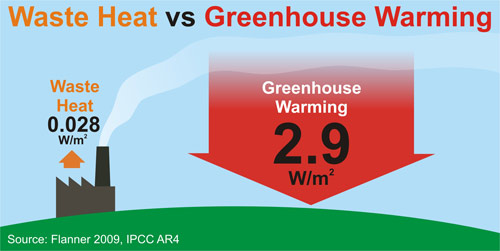Waste heat vs greenhouse warming
Posted on 27 July 2010 by John Cook
A vigorous discussion has erupted on the waste heat page. Problem is, there's not meant to be a waste heat page! As I encounter new skeptic arguments, I add them to the to-do list and gradually (very gradually) research the peer-reviewed literature then write an explanation of what the science says, usually in order of popularity. I hadn't got around to looking into the issue of waste heat. Nevertheless, one intrepid Skeptical Science user found the empty page waiting to be populated and began a discussion there (j'accuse Doug Bostrom). So let's look at waste heat...
Firstly, what is waste heat? When humans use energy, it gives off heat. Whenever we burn fossil fuels, heat is emitted. This heat doesn't just disappear - it dissipates into our environment. How much does waste heat contribute to global warming? This has been calculated in Flanner 2009 (if you want to read the full paper, access details are posted here). Flanner contributes that the contribution of waste heat to the global climate is 0.028 W/m2. In contrast, the contribution from human greenhouse gases is 2.9 W/m2 (IPCC AR4 Section 2.1). Waste heat is about 1% of greenhouse warming.

What do these numbers mean? They refer to radiative forcing, the change in energy flux at the top of the atmosphere. Or putting it in plain English, the amount of heat being added to our climate. Greenhouse warming is currently adding about 100 times more heat to our climate than waste heat.
UPDATE 27 July: there is some confusion about the term 'waste heat'. Here, what I'm talking about is all the heat generated by energy use. When humans generate energy, much of it is immediately dissipated as heat. The rest is converted to electricity or energy of some sort (eg - mechanical, chemical, etc). But even this energy eventually dissipates as heat into the environment. So yes, 'waste heat' is not an ideal term. Flanner uses the term "anthropogenic heat flux".































 Arguments
Arguments






























[DB] Both here and elsewhere: PRATT.
http://www.treehugger.com/fossil-fuels/world-energy-use-over-last-200-years-graphs.html
This figure shows energy consumption increasing linearly to 100 exaJoule per year from 1820 to 1950. The sum is 1/2 100 (1950-1820) = 6.5 ZJ.
From 1950 to 2010 it went from 100 to 550 exajoules. The sum is (450/2)(60)+100*60 = 19.5 ZJ.
Assuming a 50% efficiency, that leaves 13 ZJ went to waste heat from 1820 to 2010.
It takes 4.179 Joules to raise the temperature of 1 gram of water 1 oC
The volume of oceans (70% of earth, 510e14 m^2) down to 200 meters is 7.14e22 grams
If none of the human energy consumption over the last 190 years was rejected to space the surface temperature of the ocean would be 23 degrees C warmer.
Clearly, a lot of that energy was rejected to space and some was used to melt ice.
Equally clear is the fact that an increase 1.5 oC in surface temperature could easily be the result of accumulated waste heat from human consumption over this interval.
https://www.epa.gov/climate-indicators/climate-change-indicators-sea-surface-temperature
Ignoring human energy consumption as a forcing factor, almost all from fossil fuels, by the IPCC is easily challenged.
[TD] An important aside: Your use of the term “rejected” is unusual. If you mean “reflected” you need to use that term. If you mean “emitted” you need to use that term.
Aaron Davis:
In post 30 you say: "Assuming a 50% efficiency". The internal combustion engine in your car is about 25% efficient at its most efficient RPM. When you apply the brakes you covert any usable work into waste heat. Ultimately, all the potential energy in the fuel is converted into waste heat. Most processes in society ultimately yield no usable work, all the input energy is converted into waste heat. Your calculation would be much more accurate if you used a 100% connversion for energy into waste heat.
Your choice of 50% demonstrates that you have no basic knowledge of thermodynamics and no idea how to do your calculation. Combined with your attitude that you seem to think you know it all, why should I engage with you?
If you actually read the links the moderator gave you, you will be able to make better arguments. It is generally better to work on one issue at a time. Choose the problem you are most interested in and focus on that.